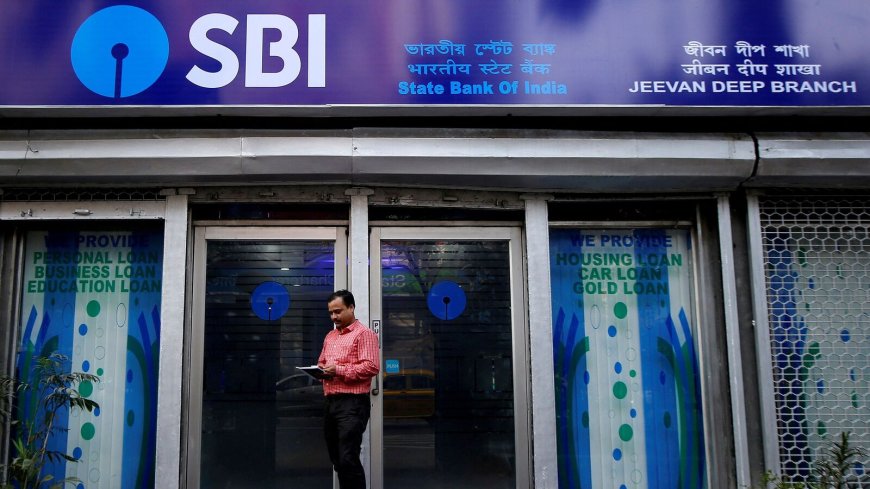SBI Shares Dip as Bank Lowers Loan Growth Outlook Amid Tariff Uncertainty
SBI stock declines after India's largest lender revises its loan growth target due to rising tariff-related concerns. Read the detailed analysis and expert outlook.

SBI Shares Fall as Lender Tempers Loan Growth Target Amid Tariff Uncertainty
Mumbai, May 5, 2025 — In a development that caught the attention of Dalal Street and financial analysts alike, shares of State Bank of India (SBI) declined by over 2.6% intraday on Monday after the lender signaled a more conservative outlook on loan growth for the upcoming financial year. The cautious stance came amid increasing tariff-related uncertainties and a macroeconomic environment that is beginning to show signs of strain.
The fall in share price follows the Q4FY25 earnings call, where SBI management indicated that while credit demand remains positive, evolving policy and tariff risks—especially in sectors like power and infrastructure—could affect disbursal momentum in FY26.
Market Reaction
SBI shares opened weak on the NSE, sliding from the previous close of ₹837.50 to an intraday low of ₹814.90, before recovering slightly to close at ₹821.65—still down ₹15.85 or 1.87%. The stock underperformed both the Nifty 50 and the Nifty Bank index, which ended the session in green.
Earnings Snapshot (Q4FY25)
| Metric | Q4FY25 | Q4FY24 (YoY) | Change (%) |
|---|---|---|---|
| Net Profit | ₹17,025 crore | ₹16,695 crore | +1.97% |
| Net Interest Income (NII) | ₹41,120 crore | ₹40,392 crore | +1.79% |
| Gross NPA Ratio | 2.52% | 2.78% | Improved |
| Loan Growth (YoY) | 13.2% | 15.4% | Slowed |
| Deposit Growth (YoY) | 11.6% | 10.9% | Improved |
What Prompted SBI’s Cautious Outlook?
1. Tariff Uncertainty in Power Sector
SBI has significant exposure to the power and utilities segment, which is currently grappling with regulatory unpredictability and delayed tariff revisions across several states. The inability of discoms to honor past agreements, coupled with pending payments, has led the bank to adopt a more watchful stance.
“Given the tariff revision lags and cross-subsidy imbalances in the power sector, we are moderating our credit growth estimates to high single digits,” said SBI Chairman Dinesh Kumar Khara during the earnings call.
2. Slow Recovery in Infrastructure Projects
Despite a healthy pipeline of infra projects, execution bottlenecks remain a challenge. SBI flagged delays in environmental clearances and policy reversals in key states as headwinds. This has impacted loan disbursements to EPC contractors and state utilities, prompting the bank to adjust its forward guidance.
3. Global Volatility & Import Cost Pressures
Uncertainty around import tariffs, especially in steel, fertilizers, and electronics, has led to working capital volatility for corporates. Many borrowers are reportedly taking a cautious approach to drawing down sanctioned loans, impacting overall credit growth.
Expert Reactions
Market Strategists
Ajay Bagga, Market Veteran:
"The market is spooked not just by the guidance cut but also the tone in SBI’s commentary. It reflects that large lenders are beginning to factor in policy instability, especially at the state level."
Banking Analysts
Nirali Shah, Head of Research, Samco Securities:
"SBI’s performance is still strong fundamentally. But the recalibration of loan growth expectations means investors should temper near-term earnings assumptions. It's not a red flag but a prudent move."
Sectoral Impact
The cautious commentary from SBI had a spillover effect on other PSU banking stocks:
| Stock | Change (%) |
|---|---|
| Bank of Baroda | -1.4% |
| Canara Bank | -1.1% |
| PNB | -0.9% |
| Union Bank | -0.7% |
Private sector lenders like HDFC Bank and ICICI Bank were mostly flat, indicating the reaction was confined to public sector players due to their exposure to government-driven sectors.
Forward Guidance
SBI’s Management Commentary:
-
Loan Growth: Projected to be between 8-10% in FY26 vs previous 12–14%
-
Focus Areas: Retail lending, especially housing and auto loans
-
Caution Zones: Power, MSMEs dependent on volatile input tariffs
-
Capital Adequacy: Comfortable with CET-1 ratio at 11.45%
Technical Outlook on SBI Stock
| Indicator | Value | Signal |
|---|---|---|
| RSI (14-day) | 47.3 | Neutral |
| 50-DMA | ₹829.20 | Slightly Bullish |
| 200-DMA | ₹788.65 | Support Zone |
| MACD | Bearish Crossover | Sell Signal |
Technical analysts suggest a range-bound movement between ₹800–₹845 in the near term. A sustained close below ₹810 could invite further weakness.
Institutional Activity
| Type | Activity on SBI (₹ Cr) |
|---|---|
| FIIs | Net Sellers - ₹540 Cr |
| DIIs | Net Buyers + ₹420 Cr |
Foreign investors took some profits off the table, while domestic institutions added to their positions, reflecting a divergence in short-term sentiment.
Impact on Nifty Bank
While Nifty Bank managed to close flat due to gains in private lenders, SBI’s drag prevented a broader rally:
-
Nifty Bank Closed: +0.15%
-
SBI Weightage in Nifty Bank: ~12%
-
A 2% fall in SBI alone shaved off over 30 points from the index.
What Should Investors Do?
Long-Term Investors:
-
Hold existing positions in SBI.
-
Focus on the bank’s stable fundamentals, robust retail franchise, and low NPA levels.
-
Consider adding on dips near ₹790–₹800, with a medium-term horizon.
Traders:
-
Avoid aggressive long positions until clarity emerges.
-
Use ₹845 as an upside resistance and ₹800 as immediate support.
-
Watch institutional flows and state tariff announcements for cues.
The fall in SBI shares today is less about financial deterioration and more about the strategic tone adopted by the management. In an uncertain tariff environment—especially with multiple elections underway—India’s largest lender is playing it safe. This decision, while prudent, naturally weighs on market sentiment in the short term.
Investors should not interpret the loan growth moderation as a structural weakness. Instead, it's a classic case of "better safe than sorry" in an economy still navigating post-COVID recovery, geopolitical uncertainty, and policy swings.
The days ahead will be crucial as the central government unveils its roadmap post-elections and state-level issues begin to ease. For now, SBI remains a fundamentally strong stock with momentum paused—but not reversed.
What's Your Reaction?
 Like
0
Like
0
 Dislike
0
Dislike
0
 Love
0
Love
0
 Funny
0
Funny
0
 Angry
0
Angry
0
 Sad
0
Sad
0
 Wow
0
Wow
0












































































